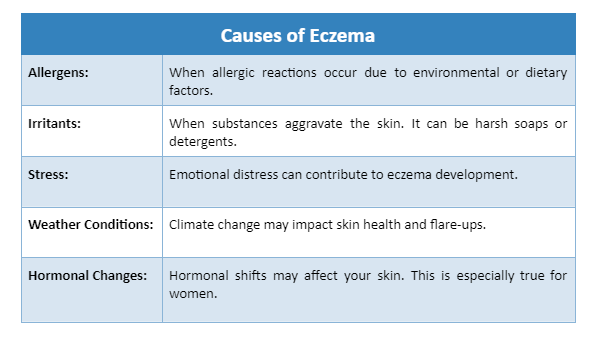
Eczema is a skin condition that encompasses various inflammatory disorders. It is characterized by red, itchy, and inflamed skin. From childhood atopic dermatitis to adult-onset types, the impact of eczema extends across ages, affecting millions worldwide. Understanding its diverse manifestations lays the foundation for comprehensive management.
Synopsis
Types of Eczema
The most common types of eczema are:
-
Atopic Dermatitis: Common in childhood; often associated with allergies.
-
Contact Dermatitis: Triggered by allergens or irritants upon skin exposure.
-
Nummular Eczema: Circular or coin-shaped patches on the skin.
-
Dyshidrotic Eczema: Small blisters, particularly on hands and feet.
-
Seborrheic Dermatitis: Affects scalp and facial regions; linked to sebum production.
What Causes Eczema?

It is important to identify these eczema causes for better management of the condition.
Key Symptoms of Eczema
The major eczema symptoms include:
-
Intense Itching that is persistent & distressing
-
Red or Inflamed Skin - the visual indicator
-
Dry and Sensitive Skin - prone to cracking and flakiness
-
Fluid-filled Blisters, are mostly seen in Dyshidrotic Eczema and are not prevalent in other types
-
Skin Discoloration, meaning changes in pigmentation due to inflammation
Depending on your symptoms, a top dermatologist in Salem can confirm the cause and type of the disease. Once they are detected, proper treatment plans can be implemented.
Natural Home Remedies for Eczema
Eczema management often extends beyond pharmaceutical solutions, with many individuals finding relief in natural home remedies. These approaches focus on nurturing the skin, reducing inflammation, and addressing triggers.
-
Hydration and Moisturisation
Adequate hydration can prevent skin dryness and minimize irritation. Different emollients offer deep hydration and anti-inflammatory benefits. It especially includes coconut oil, shea butter, and aloe vera.
-
Oatmeal Baths and Compresses
Oatmeal contains anti-inflammatory properties. So, adding it to baths can reduce itching and redness. Creating them is also quite simple and accessible.
-
Cold Compresses
Cold compresses alleviate discomfort. It constricts blood vessels and reduces inflammation. Apply it gently over the eczematous areas and for short durations.
-
Natural Oils
Tea tree oil, when diluted appropriately, possesses antimicrobial properties. It can prevent infections. On the other hand, calendula oil offers anti-inflammatory and soothing effects, promoting skin healing.
-
Herbal Infusion and Teas
Chamomile and lavender teas are known for their calming properties. When applied or used in compresses, they can relieve inflammation. Nettle tea's antioxidants may help combat inflammation when used topically or consumed.
Lifestyle and Dietary Modifications to Manage Eczema
Home remedies are often combined with lifestyle adjustments for better results.
-
Diet
|
TO INCLUDE |
TO EXCLUDE |
|
Anti-inflammatory foods, like fatty fish (omega-3 rich), fruits, vegetables, and whole grains. |
Dairy products |
Note: While eliminating potential triggers like dairy or gluten can be helpful for some, it's important to consult a nutritionist or healthcare expert for personalized dietary advice.
- Stress Management
Yoga and meditation can lower emotional stressors. Also, optimal sleep is necessary to support your overall skin health.
You can use these natural remedies individually or in combination. Tailor the approach to eczema management based on your personal preferences and sensitivities. However, it's essential to patch-test these remedies and consult with a dermatologist before implementing these remedies into your treatment plan. This is especially applicable if you have persistent or severe eczema.
Therapeutic Remedies for Eczema
While you focus on natural remedies, you must understand that their effectiveness can vary significantly from person to person. Thus, it is best to always consult with a doctor before proceeding to get natural remedies. Some of the treatments for eczema include:
-
Moisturizers: Moisturizers help to keep the skin hydrated and prevent dryness and itching.
-
Steroid creams: Steroid creams can help to reduce inflammation and itching.
-
Immunosuppressant creams: Immunosuppressant creams can help to weaken the immune system's response to triggers.
-
Phototherapy: Phototherapy uses ultraviolet light to help reduce inflammation.
-
Oral medications: Oral medications, such as corticosteroids and immunosuppressants, can be used to treat severe eczema.
Consult our dermatology hospital in Salem if you need to learn more about how to cure eczema.
Precautions Related to the Home Remedies
No matter what treatment plan you are incorporating, precautions should always be taken. Be mindful and have a clear understanding of your sensitivities.
Below, we have mentioned a few simple preventive measures.
-
Before widespread application, patch test the solutions to identify potential allergic reactions or skin sensitivities.
-
Apply a small amount of the chosen remedy to an unaffected area.
-
Take the guidance of an experienced dermatologist for personalized recommendations.
-
Ensure that your chosen remedy is compatible with your existing prescribed medications.
-
Monitor your condition regularly.
FAQ's
For severe eczema cases, you must consult your doctor before going forward with home remedies.
Yes, dietary changes can eliminate potential triggers and alleviate eczema symptoms.
The time varies depending on the severity of your condition. However, being consistent with the methods ensures faster betterment



















 5 Min Read
5 Min Read




.png)







